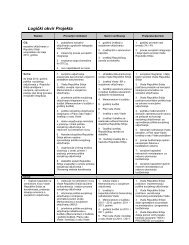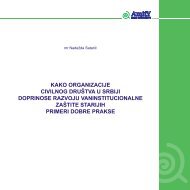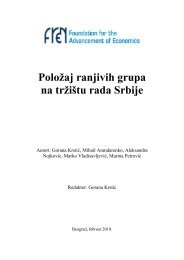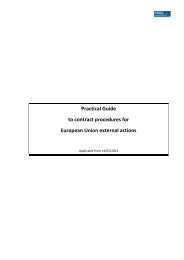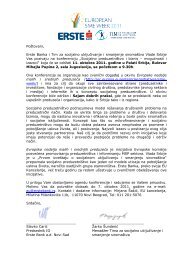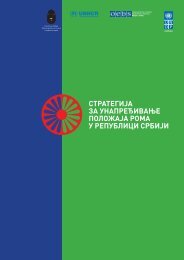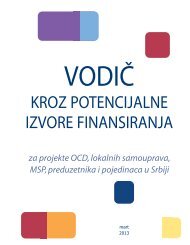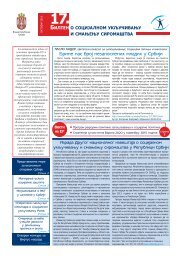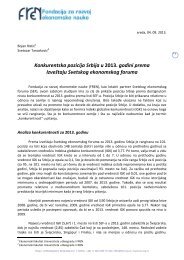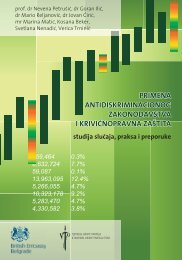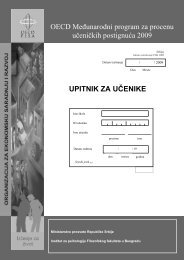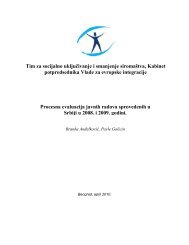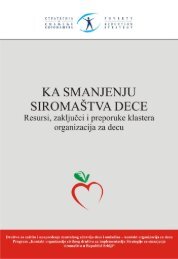Living Standards Measurements Study - Serbia 2002 - 2007
Living Standards Measurements Study - Serbia 2002 - 2007
Living Standards Measurements Study - Serbia 2002 - 2007
You also want an ePaper? Increase the reach of your titles
YUMPU automatically turns print PDFs into web optimized ePapers that Google loves.
• Rental questionnaire – in which the market value<br />
of various property types has been collected.<br />
• Other fieldwork documents produced by RSO in<br />
the period from March to May include:<br />
• Interviewer and supervisor instructions<br />
• Control form<br />
• Advance letter and leaflet<br />
• A gift - coffee and biscuits, were given to each<br />
household interviewed.<br />
In May <strong>2007</strong> a lot of effort was put into<br />
advertising the LSMS prior to fieldwork (in order to<br />
maximise response). The following activities were<br />
undertaken:<br />
• Press conference (Sava Media Centre, Belgrade,<br />
8th May <strong>2007</strong>) with six teams for Television,<br />
two for Radio and fifteen journalists.<br />
• A leaflet for potential respondents distributed to<br />
approximately 1 300 home addresses in<br />
Belgrade, in cooperation with INFOSTAN<br />
(Secretariat for Utilities and Housing services);<br />
• A leaflet with basic information on LSMS was<br />
distributed in Belgrade and municipalities that<br />
are covered by the regional offices;<br />
• Posters, announcing the survey were distributed<br />
in municipalities throughout <strong>Serbia</strong>;<br />
• Business portals (Е-gate, Vibilia);<br />
• Visits to some electronic media in Belgrade and<br />
to the HQs regional offices (informative and<br />
other sorts of broadcasts);<br />
• Visits to Index radio, Belgrade and to some local<br />
radio stations;<br />
• Information and a short animation regarding the<br />
LSMS were presented on the RSO website.<br />
Two TV stations (TV Fox and RTS 1) filmed<br />
an interview taking place within a household.<br />
During fieldwork, after an early analysis of the<br />
response rate (based on progress chasing) contact<br />
with potential respondents was intensified,<br />
primarily via television presentations, urging them<br />
to co-operate in the survey.<br />
The RSO PR dept continuously provided<br />
information relating to LSMS to all interested<br />
institutions, journalists and individuals. In total<br />
LSMS was shown on twenty six television reports.<br />
Plus there were twenty four reports in the Press,<br />
eleven on Radio and two via business portals. Due<br />
to this intensive and innovative PR strategy the final<br />
response rate achieved for the survey was<br />
particularly good (80.6%).<br />
Interviewer and supervisor briefings took place<br />
Methodology<br />
from 10-19 May. Briefing sessions were conducted<br />
at the regional offices. All field staff were provided<br />
with Instructions which contained the basic<br />
information needed for survey administration, each<br />
session was conducted semi-formally, with<br />
opportunities for questions and answers as well as<br />
for further explanation. UNHCR and WB<br />
representatives participated in briefings in Belgrade,<br />
Sremska Mitrovica, Valjevo, Pančevo, Smederevo<br />
and Novi Sad.<br />
During each briefing session, the sample<br />
addresses were distributed to each interviewer and<br />
discussed with them in detail. Ample time was<br />
allowed for a clear understanding of the materials,<br />
quantity of work expected from each interviewer<br />
and the procedures to be followed in conducting the<br />
work. Prior to leaving the briefing session each<br />
interviewer thus had: an assignment, field<br />
administration forms and a supply of survey<br />
questionnaires.<br />
Each viewer was allocated, on average, 28<br />
households. The main data collection period was<br />
scheduled for six weeks (the second half of May<br />
and all of June). In June controls on interviewers<br />
work were undertaken by supervisors. In addition<br />
160 households were checked by WB, UNHCR and<br />
UNDP representatives – very few anomalies were<br />
found. Fieldwork ended on July 6 <strong>2007</strong>.<br />
Instructions for editing were provided created<br />
at RSO by the person responsible for each module<br />
in the questionnaire. Questionnaires were edited at<br />
the central office and then given for data entry.<br />
Visual basic was the chosen data entry software.<br />
The program consisted of two main features<br />
intended to reduce the number of keying errors and<br />
to reduce the number of errors generated by the<br />
computer consistency check undertaken following<br />
data entry:<br />
• Data entry screens that included all skip patterns.<br />
• Range checks for each question<br />
The DE program was tested by those<br />
responsible for development of each module in the<br />
questionnaire. Data entry training was undertaken<br />
in June. DE staff was instructed to clear all<br />
anomalies with SIG fieldwork members. Data entry<br />
and the coding of three open-ended items<br />
(occupation, industry, highest level of education)<br />
were completed in August.<br />
165



